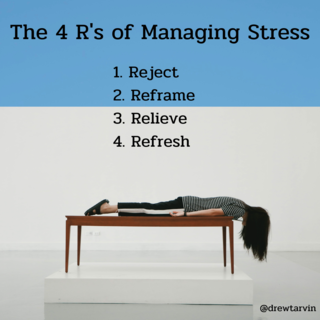Humor
How to Use Humor to Manage Stress
Here are four strategies to harness the power of humor to manage stress.
Posted October 20, 2020 Reviewed by Abigail Fagan

I remember it so vividly. I was walking out of Grand Central Station when I noticed a text from my mom telling me to call her back. My stomach dropped. I just had a bad feeling. I called her back and braced myself for the worst. And she said it: "I have cancer." I was trying to fight back tears when my mom claimed that it wasn’t all bad because “hey, free boob job.”
Now, I get how that’s a pretty dark example of humor in action, but it’s how my family rolls. My cousins and I even cracked jokes at our grandmother’s funeral. As Michelle Obama might say, “When life goes low, we try to make each other laugh.” Or something like that. And now here we are at quite possibly the lowest point of, oh I don’t know, Western civilization. Let’s run down the list: forest fires, super storms, global pandemic, impending global depression, political unrest and division, record unemployment, and we’re all supposed to stay at least six feet away from each other. Great!
Humor that Works
So I called up humor expert Andrew Tarvin, so we could talk about the role humor, play, and laughter could play in these stressful times. Drew and I improvised together on the New York City ComedySportz team, and we were definitely the onstage odd couple. He’s a fan of pun-filled jokes, and I’m more chaotic and unpredictable and can’t tell a joke to save my life. He says funny things, and I say things funny. Drew has since gone on to found a successful consulting business Humor that Works that helps businesses harness the power of humor to improve the bottom line. And I wrote Play Your Way Sane, which explores how we can use improv principles in our everyday lives to calm down, stop overthinking, and enjoy the moment.
Just like our different onstage styles, we focus on different aspects of humor and improv, but after our talk, I realized we arrived at a similar place. Humor, play, and laughter are vital and effective ways to help us calm down, de-stress, and connect with each other.

First, it’s important to clarify what we mean when we say humor, play, and laughter. Drew describes humor as the umbrella term under which play, jokes, stories, and games could all fall. Play is defined as an activity enjoyed for recreational purposes, especially by children. These are activities we do for their intrinsic joy. Stuart Brown describes play as purposeless, all-consuming, yet integral to our overall health and well-being. So play could be one way to experience humor but certainly not the only way. Laughter, on the other hand, is one possible outcome of humor, whether it be jokes, stories, or game playing.
As noted in recent New York Times and Economist articles, laughter may help relieve stress, reduce blood pressure, and help people become more resilient, in addition to other potential benefits—all much-needed given the state of the world.
And boy are we stressed. Since the pandemic began there's been a 66% increase in the number of people reporting that their mental health has been negatively affected due to the stress and worry caused by the coronavirus. More people also reported trouble sleeping or eating and increased alcohol consumption. Now more than ever, we need strategies to deal with this increased stress.
The 4 Rs of Managing Stress
Drew’s approach to using humor for managing stress centers on what he calls the “4 R’s”: Reject, Reframe, Relieve, and Refresh, and it’s a great model to think about how humor can be used strategically to manage stress during these unprecedentedly stressful times.

1. Reject
The first thing we can do when trying to reduce and manage stress is to try to eliminate stressors. Drew recommends making a list of the 10 things that are currently stressing you out and then seeing how you can get rid of as many as you can.
For example, you might be stressed out by your job, your husband, the pandemic, the election, and your hectic morning routine. You might not want to quit your job and leave your husband, but you could certainly watch less news, put your phone away, and have your husband help out more each morning.
Rejecting stressors may not be humorous, but it's a vital first step in stress management, and trust me, eliminating stressful activities can be fun. Drew even suggests creating a “To Don’t” list of all the things you’ll stop doing.
2. Reframe
Humor starts to come into play when we start reframing our stressors. You probably can’t reject everything that causes you stress. You are an adult and there are certain things you have to do. That’s when you can try to reframe them. This might mean you turn them into a game, make them more fun, or put a positive spin on them, if a positive spin exists at all. If there’s a way to gamify or gain some perspective on what’s stressing you out, do it.
My mom thinking about her breast cancer as a free boob job is a severe case of reframing. It didn’t magically make her cancer go away, but it did help her laugh at the difficulty of the situation. You could also make your morning routine more fun by making it a game. My 3-year-old daughter was stressing me out in the morning until we turned it into a game. She now has to eat breakfast, brush her teeth, get dressed, and let me do her hair before she can watch a cartoon. If she hems and haws and dawdles, no cartoon. It may not be a laugh riot, but it is way less stressful than it used to be.
3. Relieve
After rejecting and reframing stressors, it’s time to relieve stress. Because let’s be honest, some things are legit bad, and that’s okay. Let them be bad. Just be sure to be intentional about relieving the stress that they cause. This might mean taking a walk, drawing a hot bubble bath, breathing exercises, meditating, or watching ten minutes of funny cat videos on YouTube.
Drew recommends keeping a humor journal to keep track of things that add humor to your life. It doesn’t matter if you’re the life of the party or a wallflower, most people have some kind of sense of humor. If you don’t consider yourself a funny person, then Drew suggests being a humor curator. Collect and share things that make you laugh and add humor to your life to start relieving your stress.
4. Refresh
The final R is a little depressing in light of our current pandemic; it’s to refresh. We used to be able to take vacations and let our stresses melt away, but an underlying sense of stress is following us everywhere we go now. Did I bring my mask? Am I far enough away from people? Do I have COVID-19?
So instead of traveling, think about how you can take breaks to refresh yourself. Take staycations, travel the world via Google Maps, find a way to relax in your own home. And don’t limit your breaks to just two weeks a year or even the weekend. Drew also suggests the Pomodoro technique where you work for 25 minutes and then take a five-minute break. Adding humor to that five-minute break can give you even more of those physiological de-stressing benefits.
Final Thoughts
We may be stuck in our houses and juggling more stressors than ever before, but that doesn’t mean we throw in the towel and become humorless. Humor, and its resultant laughter, can help us relieve stress in even the most stressful times. Now, I’m not saying you have to have gallows humor like my twisted family, but using humor to reject, reframe, relieve, and refresh with can help you manage your stress, which is going to be crucial to getting through this year.
References
Bartleby. Why we need to laugh at work. Retrieved October 20, 2020, from https://www.economist.com/business/2020/10/03/why-we-need-to-laugh-at-w…
Brown, S. L. (2009). Play: How it shapes the brain, opens the imagination, and invigorates the soul. Penguin.
Drinko, C. (2021). Play Your Way Sane. New York, NY: Simon & Schuster.
Nowell, D.D. "Manage Procrastination With the Pomodoro Technique." Psychology Today. Retrieved October 20, 2020, from https://www.psychologytoday.com/us/blog/intrinsic-motivation-and-magica…
Panchal, N., Kamal, R., Orgera, K., Cox, C., Garfield, R., Hamel, L., . . . Chidambaram, P. (2020, August 21). The Implications of COVID-19 for Mental Health and Substance Use. Retrieved October 16, 2020, from http://www.kff.org/coronavirus-covid-19/issue-brief/the-implications-of…
Schiffman, R. (October 1, 2020). Laughter May Be Effective Medicine for These Trying Times. Retrieved October 16, 2020, from http://www.nytimes.com/2020/10/01/well/mind/laughter-may-be-effective-m…
Tarvin, A. (2012). Humor that works: 501 ways to use humor to beat stress, increase productivity, and have fun at work. New York: Humor That Works.
Tarvin, A. (2019). Humor that Works: The Missing Skill for Success and Happiness at Work. Page Two.




